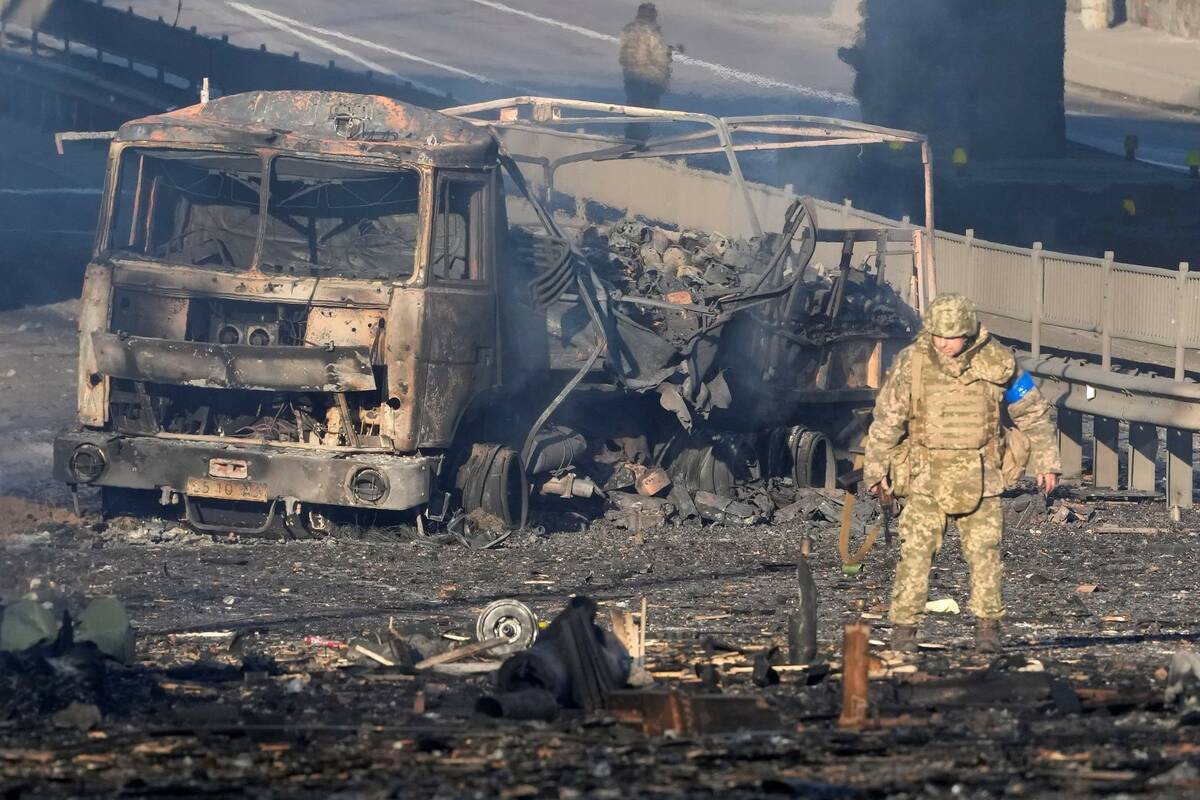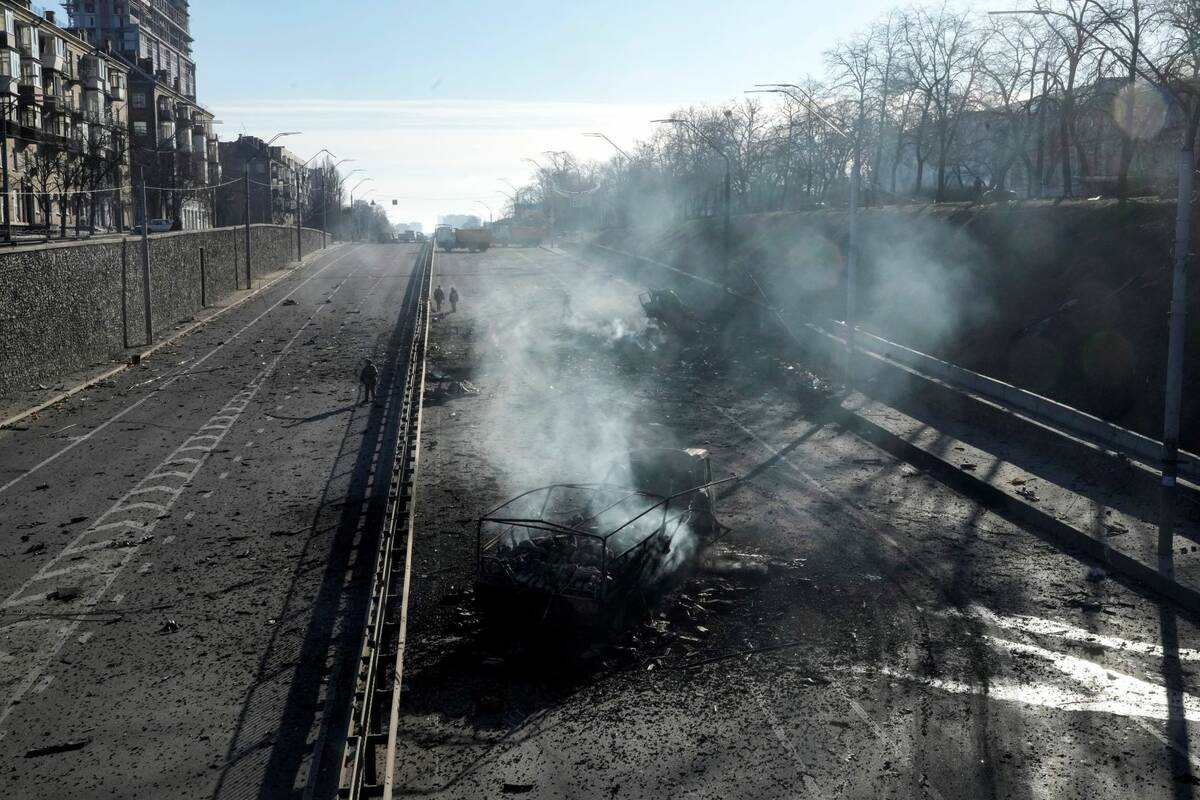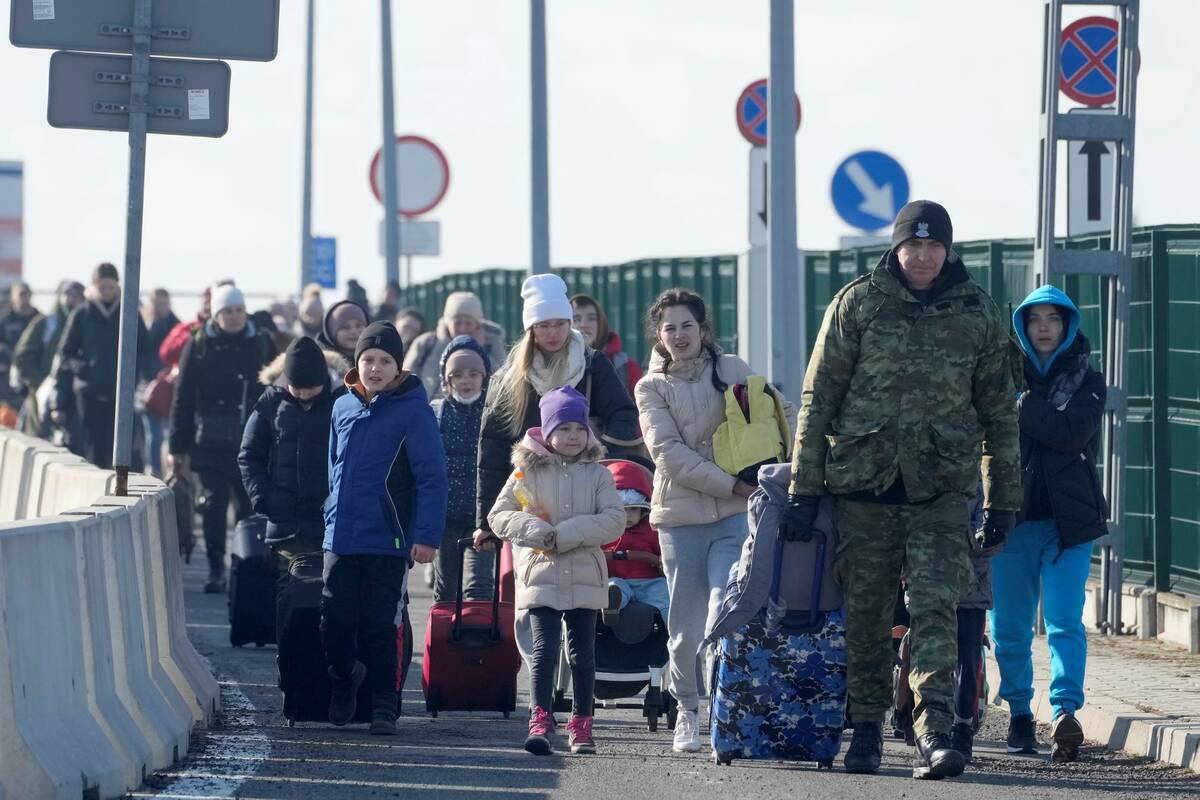Huge blasts light up early Sunday sky near Kyiv
KYIV, Ukraine — Russia unleashed a wave of attacks on Ukraine targeting airfields and fuel facilities in what appeared to be the next phase of an invasion that has been slowed by fierce resistance. The U.S. and EU responded with weapons and ammunition for the outnumbered Ukrainians and powerful sanctions intended to further isolate Moscow.
Huge explosions lit up the sky early Sunday south of the capital, Kyiv, where people hunkered down in homes, underground garages and subway stations in anticipation of a full-scale assault by Russian forces.
Flames billowed into the sky before dawn from an oil depot near an air base in Vasylkiv, where there has been intense fighting, according to the town’s mayor. President Volodymyr Zelenskyy’s office said another explosion was at the civilian Zhuliany airport.
Zelenskyy’s office also said Russian forces blew up a gas pipeline in Kharkiv, the country’s second-largest city, prompting the government to warn people to protect themselves from the smoke by covering their windows with damp cloth or gauze.
“We will fight for as long as needed to liberate our country,” Zelenskyy vowed.
Terrified men, women and children sought safety inside and underground, and the government maintained a 39-hour curfew to keep people off the streets. More than 150,000 Ukrainians fled for Poland, Moldova and other neighboring countries, and the United Nations warned the number could grow to 4 million if fighting escalates.
President Vladimir Putin hasn’t disclosed his ultimate plans, but Western officials believe he is determined to overthrow Ukraine’s government and replace it with a regime of his own, redrawing the map of Europe and reviving Moscow’s Cold War-era influence.
To aid Ukraine’s ability to hold out, the U.S. pledged an additional $350 million in military assistance to Ukraine, including anti-tank weapons, body armor and small arms. Germany said it would send missiles and anti-tank weapons to the besieged country and that it would close its airspace to Russian planes.
UN sets 2 Monday meetings
The U.N.’s two major bodies — the 193-nation General Assembly and the more powerful 15-member Security Council — will hold separate meetings Monday on Russia’s invasion of Ukraine, a reflection of widespread international demands for an immediate cease-fire and escalating concern for the plight of millions of Ukrainians caught up in the war.
The Security Council gave a green light Sunday for the first emergency session of the General Assembly in decades. It will give all U.N. members an opportunity to speak about the war Monday and vote on a resolution later in the week that U.S. Ambassador Linda Thomas-Greenfield said would “hold Russia to account for its indefensible actions and for its violations of the U.N. Charter.”
French Ambassador Nicolas De Riviere announced that the Security Council will hold a meeting Monday afternoon on the humanitarian impact of Russia’s invasion, a session sought by French President Emmanuel Macron to ensure the delivery of aid to growing numbers of those in need in Ukraine.
Both meetings follow Russia’s veto Friday of a Security Council resolution demanding that Moscow immediately stop its attack on Ukraine and withdraw all troops. The vote was 11-1, with China, India and the United Arab Emirates abstaining.
De Riviere said France and Mexico will propose a draft resolution “to demand the end of hostilities, protection of civilians, and safe and unhindered humanitarian access to meet the urgent needs of the population.” It said it will probably be put to a vote Tuesday.
Sunday’s vote in the Security Council on a resolution co-sponsored by the United States and Albania to authorize the General Assembly session was exactly the same as on Friday — 11-1 and three abstentions. But because council approval for such a session is considered a procedural vote there are no vetoes and the resolution got more than the minimum nine “yes” votes needed for approval.
‘Selected’ Russian banks blocked
The U.S., European Union and United Kingdom agreed to block “selected” Russian banks from the SWIFT global financial messaging system, which moves money around more than 11,000 banks and other financial institutions worldwide, part of a new round of sanctions aiming to impose a severe cost on Moscow for the invasion. They also agreed to impose ”restrictive measures” on Russia’s central bank.
It was unclear how much territory Russian forces had seized or to what extent their advance had been stalled. Britain’s Ministry of Defense said “the speed of the Russian advance has temporarily slowed likely as a result of acute logistical difficulties and strong Ukrainian resistance.”
A senior U.S. defense official said more than half the Russian combat power that was massed along Ukraine’s borders had entered the country and Moscow has had to commit more fuel supply and other support units inside Ukraine than originally anticipated. The official spoke on condition of anonymity to discuss internal U.S. assessments.
The curfew forcing everyone in Kyiv inside was set to last through Monday morning. The relative quiet of the capital was sporadically broken by gunfire.
Fighting on the city’s outskirts suggested that small Russian units were trying to clear a path for the main forces. Small groups of Russian troops were reported inside Kyiv, but Britain and the U.S. said the bulk of the forces were 19 miles (30 kilometers) from the city’s center as of Saturday afternoon.
Russia claims its assault on Ukraine from the north, east and south is aimed only at military targets, but bridges, schools and residential neighborhoods have been hit.
198 civilians killed
Ukraine’s health minister reported Saturday that 198 people, including three children, had been killed and more than 1,000 others wounded during Europe’s largest land war since World War II. It was unclear whether those figures included both military and civilian casualties.
A missile struck a high-rise apartment building in Kyiv’s southwestern outskirts near one of the city’s two passenger airports, leaving a jagged hole of ravaged apartments over several floors. A rescue worker said six civilians were injured.
Ukraine’s ambassador to the U.S., Oksana Markarova, said troops in Kyiv were fighting Russian “sabotage groups.” Ukraine says some 200 Russian soldiers have been captured and thousands killed.
Markarova said Ukraine was gathering evidence of shelling of residential areas, kindergartens and hospitals to submit to The Hague as possible crimes against humanity.
Open to talks
Zelenskyy reiterated his openness to talks with Russia in a video message, saying he welcomed an offer from Turkey and Azerbaijan to organize diplomatic efforts, which so far have faltered.
The Kremlin confirmed a phone call between Putin and Azerbaijani President Ilham Aliyev but gave no hint of restarting talks. A day earlier, Zelenskyy offered to negotiate a key Russian demand: abandoning ambitions of joining NATO.
Putin sent troops into Ukraine after denying for weeks that he intended to do so, all the while building up a force of almost 200,000 troops along the countries’ borders. He claims the West has failed to take seriously Russia’s security concerns about NATO, the Western military alliance that Ukraine aspires to join. But he has also expressed scorn about Ukraine’s right to exist as an independent state.
The effort was already coming at great cost to Ukraine, and apparently to Russian forces as well.
Ukrainian artillery fire destroyed a Russian train delivering diesel to troops heading toward Kyiv from the east, said Anton Gerashchenko, an adviser to the interior minister.
The country’s Infrastructure Ministry said a Russian missile was shot down early Saturday as it headed for the dam of the sprawling reservoir that serves Kyiv. The government also said a Russian convoy was destroyed. Video images showed soldiers inspecting burned-out vehicles after Ukraine’s 101st brigade reported destroying a column of two light vehicles, two trucks and a tank. The claim could not be verified.
Highways into Kyiv from the east were dotted with checkpoints manned by Ukrainian troops and young men in civilian clothes carrying automatic rifles. Low-flying planes patrolled the skies, though it was unclear if they were Russian or Ukrainian.
In addition to Kyiv, the Russian assault appeared to focus on Ukraine’s economically vital coastal areas, from near the Black Sea port of Odesa in the west to beyond the Azov Sea port of Mariupol in the east.
Ukrainian soldiers in Mariupol guarded bridges and blocked people from the shoreline amid concerns the Russian navy could launch an assault from the sea.
“I don’t care anymore who wins and who doesn’t,” said Ruzanna Zubenko, whose large family was forced from their home outside Mariupol after it was badly damaged by shelling. “The only important thing is for our children to be able to grow up smiling and not crying.”
Fighting also raged in two eastern territories controlled by pro-Russia separatists. Authorities in Donetsk said hot water supplies to the city of about 900,000 were suspended because of damage to the system by Ukrainian shelling.
U.S. evacuation offer rejected
The U.S. government urged Zelenskyy early Saturday to evacuate Kyiv but he turned down the offer, according to a senior American intelligence official with direct knowledge of the conversation. Zelenskyy issued a defiant video recorded on a downtown street, saying he remained in the city.
“We aren’t going to lay down weapons. We will protect the country,” he said. “Our weapon is our truth, and our truth is that it’s our land, our country, our children. And we will defend all of that.”
Hungary and Poland both opened their borders to Ukrainians.
Refugees arriving in the Hungarian border town of Zahony said men between the ages of 18 and 60 were not being allowed to leave Ukraine.
“My son was not allowed to come. My heart is so sore, I’m shaking,” said Vilma Sugar, 68.
At Poland’s Medyka crossing, some said they had walked for 15 miles (35 kilometers) to reach the border.
“They didn’t have food, no tea, they were standing in the middle of a field, on the road, kids were freezing,” Iryna Wiklenko said as she waited on the Polish side for her grandchildren and daughter-in-law to make it across.
Officials in Kyiv urged residents to stay away from windows to avoid debris or bullets.
Shelves were sparsely stocked at grocery stores and pharmacies, and people worried how long food and medicine supplies might last.
NATO, U.S. trroops bolstered
The U.S. and its allies have beefed up forces on NATO’s eastern flank but so far have ruled out deploying troops to fight Russia. Instead, the U.S., the European Union and other countries have slapped wide-ranging sanctions on Russia, freezing the assets of businesses and individuals including Putin and his foreign minister.
Dmitry Medvedev, the deputy head of Russia’s Security Council, warned that Moscow could react by opting out of the last remaining nuclear arms pact, freezing Western assets and cutting diplomatic ties.
“There is no particular need in maintaining diplomatic relations,” Medvedev said. “We may look at each other in binoculars and gunsights.”































